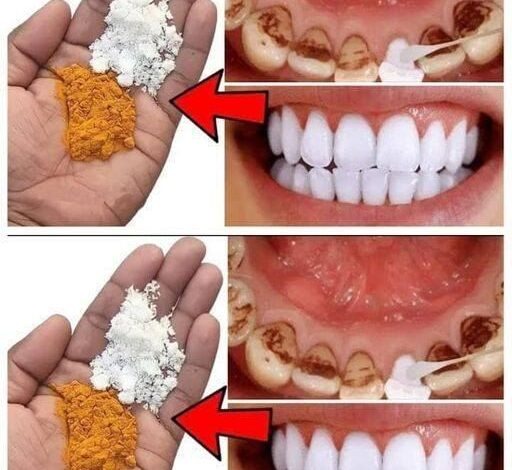Natural Remedies with Cloves and Bay Leaves for a Brighter Smile
Maintaining a bright, radiant smile is more than just a cosmetic desire—it’s a reflection of good oral health and hygiene. While the market is flooded with teeth-whitening products and treatments that promise quick results, many people are now turning to natural remedies for a safer, affordable, and more holistic approach. Among these natural remedies, two simple yet powerful kitchen staples stand out: cloves and bay leaves.
Both of these humble ingredients have been used for centuries in traditional medicine for their wide array of health benefits, including oral care. In this guide, we’ll explore how cloves and bay leaves can help you achieve a brighter smile, along with their benefits, scientific basis, and practical methods of use.
Why Cloves and Bay Leaves?

Cloves and bay leaves are far more than aromatic spices used in cooking; they are treasure troves of beneficial properties that promote oral health. Let’s break down what makes them so effective:
Cloves
Cloves are dried flower buds from the clove tree (Syzygium aromaticum), native to Indonesia. They are renowned for their antibacterial, antifungal, and analgesic properties. In the context of oral health, cloves have several key benefits:
- Natural Antiseptic: Cloves contain eugenol, a compound with potent antimicrobial and pain-relieving properties. Eugenol not only helps kill bacteria that cause plaque and bad breath but also soothes gum inflammation.
- Reduces Stains: The mild abrasiveness of clove powder can help in reducing surface stains on teeth, leaving them visibly brighter over time.
- Prevents Cavities: Clove oil can inhibit the growth of cavity-causing bacteria, protecting teeth and gums.
Bay Leaves
Bay leaves, derived from the laurel tree (Laurus nobilis), have been prized for their aromatic qualities and medicinal properties. When it comes to oral health, bay leaves shine due to their unique features:
- Mild Abrasive Quality: Bay leaf powder acts as a gentle scrub, helping to remove plaque and surface stains from teeth.
- Rich in Antioxidants: Packed with vitamins A and C, bay leaves help fight free radicals, promoting overall oral health and brighter teeth.
- Freshens Breath: Bay leaves have natural deodorizing properties, leaving your mouth feeling fresh.
How Do Cloves and Bay Leaves Help Brighten Teeth?
The discoloration of teeth occurs due to various factors, including poor oral hygiene, consumption of staining foods and drinks (like coffee and wine), and smoking. Plaque buildup and tartar also contribute to a dull appearance. The combined use of cloves and bay leaves addresses these issues holistically:
- Fighting Stains: The abrasive nature of both cloves and bay leaves helps polish teeth, reducing stains and restoring their natural whiteness.
- Reducing Plaque: Their antimicrobial properties help eliminate plaque-causing bacteria, preventing discoloration and promoting a healthier smile.
- Promoting Gum Health: Healthy gums are the foundation of a radiant smile. Cloves, in particular, soothe gum inflammation and prevent gum disease, which can otherwise lead to tooth discoloration.
DIY Remedies Using Cloves and Bay Leaves for a Brighter Smile
Here are some effective and easy-to-make natural remedies that combine the power of cloves and bay leaves for teeth whitening and overall oral health:
1. Clove and Bay Leaf Tooth Powder
This simple, homemade tooth powder can be used daily to brighten your teeth naturally.
Ingredients:
- 1 tablespoon dried bay leaves
- 1 tablespoon dried cloves
- 1 teaspoon baking soda (optional, for enhanced whitening)
Instructions:
- Grind the dried bay leaves and cloves into a fine powder using a blender or mortar and pestle.
- Mix the powder thoroughly and store it in an airtight container.
- To use, dip a damp toothbrush into the powder and brush your teeth gently for 2–3 minutes. Rinse well with water.
Benefits:
This mixture gently scrubs away stains, kills bacteria, and leaves your mouth feeling fresh.
2. Clove and Bay Leaf Mouth Rinse
A natural mouthwash infused with cloves and bay leaves can help freshen your breath and improve oral hygiene.
Ingredients:
- 2 cups of water
- 5 dried bay leaves
- 5–6 cloves
Instructions:
- Boil the water in a saucepan and add the bay leaves and cloves.
- Let the mixture simmer for 10–15 minutes.
- Strain the liquid and allow it to cool. Store it in a clean bottle.
- Use the rinse after brushing your teeth, swishing it around your mouth for 30 seconds.
Benefits:
This rinse helps kill bacteria, reduces plaque buildup, and keeps your breath fresh.
3. Clove Oil Spot Treatment for Stains
Clove oil can be used as a targeted treatment for stubborn stains on teeth.
Ingredients:
- 1–2 drops of clove oil
- A cotton swab
Instructions:
- Dab a cotton swab in clove oil and gently rub it on the stained areas of your teeth.
- Leave it on for 1–2 minutes, then rinse thoroughly with water.
Benefits:
Clove oil not only brightens teeth but also provides a refreshing and pain-relieving effect on gums.
4. Bay Leaf and Orange Peel Scrub
For an added whitening boost, combine bay leaves with orange peel, which contains natural acids that help remove stains.
Ingredients:
- 1 tablespoon dried bay leaves
- 1 tablespoon dried orange peel
- A few drops of water
Instructions:
- Grind the bay leaves and orange peel into a fine powder.
- Mix the powder with a few drops of water to form a paste.
- Apply the paste to your teeth using a toothbrush, scrubbing gently for 1–2 minutes. Rinse thoroughly.
Benefits:
This paste combines the stain-removing power of bay leaves with the natural whitening properties of orange peel.
Precautions When Using Natural Remedies
While cloves and bay leaves are generally safe, it’s essential to use them appropriately to avoid potential side effects:
- Avoid Overuse: Excessive use of abrasive substances can wear down enamel. Stick to 2–3 applications per week.
- Dilute Essential Oils: Clove oil is highly concentrated and should be used sparingly to prevent gum irritation.
- Consult a Dentist: If you have sensitive teeth, gum disease, or other oral health issues, consult a professional before trying new remedies.
The Science Behind Natural Remedies
Scientific studies support the use of cloves and bay leaves for oral care. Research has shown that eugenol in cloves has potent antimicrobial effects, making it effective against oral pathogens. Bay leaves, on the other hand, contain compounds like cineole and linalool, which have been found to inhibit bacterial growth. These properties, combined with their gentle abrasiveness, make them ideal for maintaining a brighter smile.
Conclusion
A brighter smile doesn’t have to come from expensive treatments or chemical-laden products. By incorporating natural remedies like cloves and bay leaves into your oral care routine, you can achieve a radiant, healthy smile while avoiding harsh chemicals.
These simple, time-tested ingredients not only whiten teeth but also promote overall oral health. With their antimicrobial properties, they fight plaque, reduce stains, and leave your mouth feeling fresh and clean. Best of all, they’re affordable and easy to use, making them accessible to everyone.
So, the next time you’re in your kitchen, take a moment to appreciate the power of nature hidden in your spice rack. A brighter, healthier smile could be just a clove and a bay leaf away!



